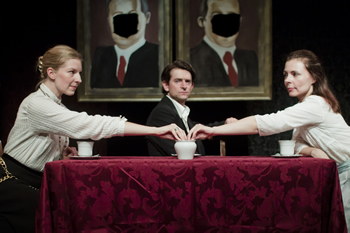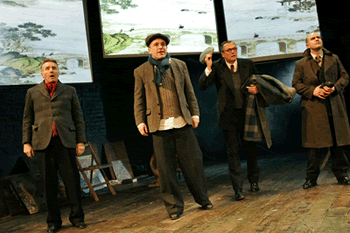HotReview.org Editor's
Picks
Shows Worth Seeing:

Ritter, Dene, Voss
By Thomas Bernhard
La Mama Experimental Theatre Club
74A E. 4th St.
Box office: 212-475-7710
It ought to be embarrassing
that Ritter, Dene, Voss, written in 1984 and frequently
revived on German-language stages ever since, is only now receiving
its American premiere. Alas, such neglect can’t embarrass
us forgetful Americans, as just about everything foreign, or slightly
“difficult,” or older than Justin Bieber, is neglected
on our stages. At any rate, the play is here now, thanks to a
scrappy Canadian company called One Little Goat, and anyone who
has never experienced the curious magnetism of the Austrian provocateur
Thomas Bernhard ought to check out one of its remaining performances.
Bernhard, who died in 1989,
was a strange bird: a perpetual whiner who loved to pour satirical
salt into old social wounds but who nevertheless found numerous
ways to make his whining theatrically compelling. His most effective
strategy was self-conscious theatricality, used to particularly
fine advantage in Ritter, Dene, Voss. On the surface,
this work is a thinly fictionalized story about the philosopher
Ludwig Wittgenstein (here called Worringer) and his two incestuously
attentive sisters, set on a day when Ludwig returns home from
confinement in a mental institution. Innocuous complaints about
household practicalities devolve into steamy confessions, discussions
about medical treatment explode into social and political invective,
and spur-of-the-moment philosophical apercus veer off into personal
insult. The characters’ naturalistic surface is barely skin
deep, for they are always aware that they are players—watching
their own moves, feints and strategies, as if trying to outfox
themselves as well as each other. There’s something Strindbergian
about these people. They swell in stature as they talk, ultimately
standing as bold ciphers or grandiose philosophical positions
as much as specific people.
Adam Seelig’s production
captures Bernhard’s layered and deliberately off-balance
histrionic quality extremely well. The sisters, played by Shannon
Perreault and Maev Beaty, provide a solid quasi-naturalistic basis
for the action but don’t get so attached to it that they
can’t shift instantly into more rhetorical or fantastical
attitudes when the text demands it. Jordan Pettle is even better
as the mercurial brother. Spoiled, willful, entitled, appallingly
unstable but mercilessly calculating, he plays the two women off
one another so expertly that his mere presence injects a wonderfully
tense note of unpredictability into the action. The production
isn’t perfect. Many physical antics surrounding Ludwig’s
tantrums have unfortunately been cut, and not all the dialogue's
jarring shifts of tone have been solved. What’s here is
truly impressive, however, especially given the foreignness of
the material. A better Bernhard won’t come along soon in
NYC.
--------------------------------

The Pitmen Painters
MTC's Samuel J. Friedman Theatre
261 W. 47th St.
Box office: 212-239-6200
Anyone who saw the musical
Billy Elliot, for which Lee Hall wrote the book, will
recognize the milieu of The Pitmen Painters right away.
British coal miners overcome daunting educational and experiential
obstacles to become artists. Hall evidently felt that Billy
Elliot left certain aspects of this collision-of-worlds-scenario
unexplored. The musical dealt with the heroic escape of a talented
young boy from a culturally deprived world in the 1980s. The
Pitmen Painters tells a story about that world (half a century
earlier) itself becoming a bit less culturally deprived when a
group of miners in the 1930s, prompted by an art history teacher
trying to deepen their connection to the subject, persuades them
to try painting. They discover a talent and inspiration for it,
and shortly become national sensations. Based on a true story,
this drama probes questions of class identity, class condescension,
fear of social mobility, and selling out that did not fit the
aims of a feel-good musical, and while no one who had thought
much about these matters would say the probing goes very deep,
Hall has handled it honestly and cogently. He also keeps things
interesting, swift and fun, and the cast of this British import
performs with infectious energy and conviction. Beyond that, the
play has unquestionable documentary value. It’s a delight
to learn about these remarkable men and see so many examples of
their work projected upstage. Don't miss the beautifully illustrated
book about them by William Feaver, from which Hall worked, on
sale in the lounge.
